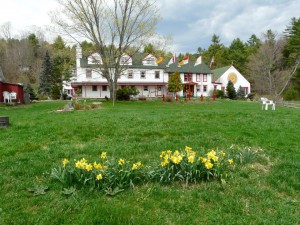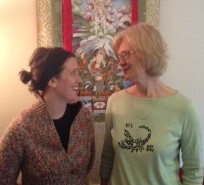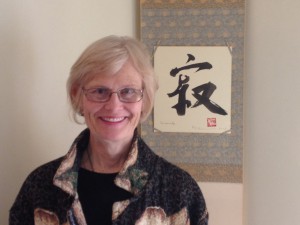Wednesday
Mandala ProjectsComing Into Focus
 Interview about the Mukpo Institute at Karme Choling
Interview about the Mukpo Institute at Karme Choling
with Rupa Acharya Suzann Duquette
by Cati Hellerer
Mukpo Institute is a three-month investigation into the Shambhala and Buddhist teachings offered every Fall and Spring at Karme Choling Shambhala Meditation Center in Barnet, Vermont.
What inspires you about Mukpo Institute?
“I’m inspired by Mukpo Institute,” shared Rupa Acharya Suzann Duquette, “because it’s a laboratory for creating awake culture. It’s a great delight to have the opportunity to be with people who are able to test out and experience meditation and study intensively, to work with their mind in community. You begin to see on the ground what happens when you are waking up and creating a culture based on each individual wanting to focus on awakening his or her heart and mind.”
“The cultural aspect,” Acharya Duquette continued, “is very inspiring and intriguing. How does that kind of culture happen? How does Mukpo Institute work with creating a culture of individuals who become beacons, where the culture itself becomes a beacon, a magnetizing light of how things work? That can change small environments and big environments. It can change organizations and whole cities, nations, and on and on and on!”
This is the excitement with which my interview with Acharya Suzann Duquette began. A few months ago, I asked Acharya Duquette if I could interview her about Mukpo Institute of which she is one of the core faculty members. As the Mukpo Institute Coordinator at the time, I had the amazing privilege of living and working at Karme Choling. Acharya Duquette is Karme Choling’s Resident Acharya. She invited me into her office on the second floor.
What do you love most about Mukpo Institute?
I love to see what happens when people are in this rich environment over the three months of the Mukpo Institute semester, to see how that transforms people. It’s just really amazing! You wouldn’t think that it would happen in such a short time, but it does! It’s always delightful what happens, and it happens every time.
I love to watch students become themselves, to emerge more clearly as who they are. It’s like watching a transformation of an outline or an impression of someone becoming a clear manifestation of the heart and mind of who they are, and a three-dimensional caring about themselves and other people in the world.
The Mukpo curriculum of selected programs balances deep study, reading, learning about different topics of Shambhala Buddhism with deep practice, just being, working with one’s mind through sitting meditation on the cushion. Walking the land, listening to the frogs in the pond, seeing the spruce trees, there’s this intermixing of study, meditation and working with one’s mind in a spacious way. This is coupled with learning disciplines that bring out meditative mind, like learning how to work with flowers (the tradition of Ikebana), how to lead a meditation session, exploring different components of leadership, and Kyudo, which is a form of mind practice using bow and arrow. It’s not about hitting the target so much as how you’re working with your mind in this very powerful form.
What have you observed in the Mukpo students while at Karme Choling?It seems that what happens on a Mukpo student’s journey is that there’s a time where you wonder why you came. Every semester, there are weekend programs, ten-day programs, and a month-long program of sitting and walking meditation mixed with study and talking to a meditation instructor.
At some point along the way there’s this question, “Why am I here?” or, “This is an intense situation for me.” Why is that? Mukpo students spend pretty much 24/7 learning to get to know themselves at a deeper level. They’re practicing, they’re studying, they’re really learning all the time. At some point it’s like, “This is a lot.” Some people get very feisty and some people get teary; it’s like an eye of the needle. As students continue to work with themselves, ask questions, lean in, they usually find the other side of this experience – a pathway to softening and opening up to a bigger expression of themselves and a bigger view of how they fit with others and in a bigger world.
There’s always this creation of a community within a community that happens with Mukpo Institute, too. Friendships happen, bonding happens, honest conversation happens. There’s real caring among people who may have never met, but who share this interest in growing and deepening and learning about themselves and how to benefit others. So there’s the Mukpo community within the larger community of Karme Choling that forms and creates very deep friendships. This then radiates out to the Karme Choling community and from the Karme Choling community back into this smaller community of Mukpo Institute.
As a Mukpo student, you are inside a community that’s not perfect. It’s a community that’s not all figured out, structured or clear, but rather a community that’s alive, a dynamic organism. It is always growing, figuring itself out, and there’s always confusion! At any point, some things are working and some things aren’t. But it has this good-heartedness and shared yearning to wake up. There’s a yearning to touch what’s ultimately good in oneself and to work with others when there’s difficulty, inter-relationally or environmentally.
Why do you think it’s important to get to know oneself?
How do you think Mukpo Institute influences a student’s life after they leave?
I think the more conscious we become, the more we can experience spacious appreciation of what we do, how things unfold, and what happens in the world. It becomes more interesting when we add a level of potential curiosity rather than being on automatic. This leads to a richer world because you see things in multi-dimensional ways instead of just one way. I think this is a part of why people become more themselves at Mukpo.
Coming into focus is this kind of acknowledgment of who we are and curiosity about where that leads and how it plays out. It becomes more alive than automatic, and I think one gets a taste for that. It can be scary. There is that eye of the needle quality that happens again and again in getting to know oneself and becoming more familiar with conscious living versus unconscious living. I think the students develop a taste for that and for questioning rather than fear. This leads to a more joyful mind, and so they bring that quality with them wherever they go. Life becomes more dynamic, fluid, and surprising – more magical! The whole thing starts opening up, which is a very profound way to live one’s life. I think people take that with them from Mukpo Institute and from Karme Choling into whatever they do, wherever they go.
How is Mukpo Institute a training in leadership?
It’s interesting to ask, “What is leadership?” Sometimes we think leadership is the top management, or a president, or the head of an organization. But within Shambhala, everybody is a leader because everybody affects everybody else.
Flexibility of mind is part of leadership. Through meditation, you begin to let go of holding on to being a certain way. You become willing to allow whoever you are in the moment to be, and willing to look at and embrace that, not steer away, close it down or change it, but ride it, ride the horse of mind. That reveals a very magnetizing person because there’s fearlessness, strength, vulnerability, and self-knowledge. So those are some of the qualities of leadership that I think emerge when people take the time to work with themselves and go deeper, especially within community.
Also within the Mukpo Institute you’re going through the path visibly, in community. That is a very powerful aspect because you are alone and yet you are not alone. There’s no being invisible. There’s no hiding out. You can try, but you can’t hide out. Clearly not hiding out is an important aspect of leadership, too. At some point along the way, you have to be willing to be transparent. You have to walk the talk, do what you say you’re going to do. And you have to offer who you are, your particular magic and view. That’s Mukpo!
Learn more about the Mukpo Institute at Karme Choling by clicking here.


















